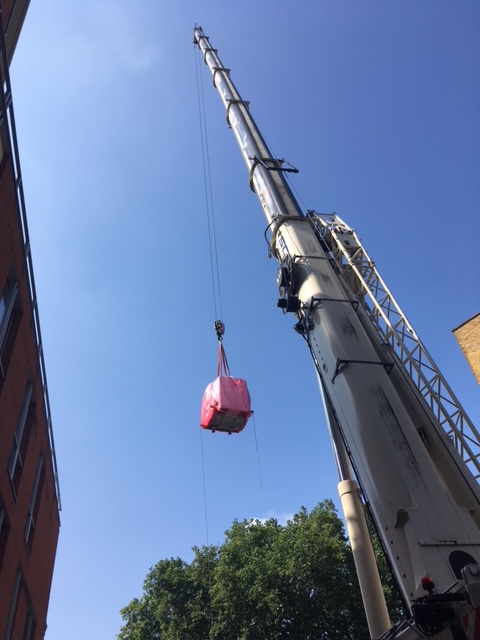- The London Clinic, a private hospital and charity in Harley Street, will be the first hospital in the UK to offer patients the latest diagnostic imaging with the new Siemens MAGNETOM Vida 3T MRI scanner
- Patients with cancer, orthopaedic (spine, shoulders, knees and hips), urology (prostate and bladder) and neurology (brain) conditions will benefit from high-quality diagnostic scans with the latest 3T MRI technology
- Scanner was lowered by high-rise crane into hospital roof in central London
Patients at The London Clinic, a private hospital and charity, will be the first in the UK to access the latest MRI imaging technology.
A high-rise crane carefully lowered the multi-million pound Siemens 3T MRI scanner through the hospital’s roof on 14 July.
The London Clinic, based in Harley Street, is the first in the UK to install the new Siemens MAGNETOM Vida 3T MRI scanner, which offers high-quality diagnostic imaging to patients with cancer, orthopaedic, urology and neurological conditions.
A 3T (3 Tesla) MRI scanner works by generating a magnetic field that is twice the strength of other 1.5 Tesla scanners widely available in other hospitals.
The image clarity and detail is particularly beneficial for health conditions involving the brain, spine, musculoskeletal system and heart, clearly showing small structures or disease within the body, such as small tumours.
“We are proud that The London Clinic is the first hospital in the UK to offer our consultants and patients access to the new Siemens MAGNETOM Vida 3T MRI scanner,” said Al Russell, chief executive at The London Clinic.
“Our multi-million pound investment provides more appointments and comfort for patients and is a key part of strategy to support our consultants in accurate diagnosis to deliver the best health outcomes for patients.
“The crane installation in central London was a spectacle in the skyline and expertly managed by the project team.”
Sophie Auld, interim director of clinical services, added: “Our new MRI suite is located in our purpose-built cancer centre, the Duchess of Devonshire Wing.
“The priority when designing the suite was patient comfort, ensuring we set the stage for our patients to feel at ease during their stay with us.
“This 3T MRI technology produces a higher spatial resolution, resulting in better visualisation of anatomic structures and subtle abnormalities can more easily be detected in cancer, orthopaedics, urology and neurology conditions.
“Improved imaging allows the early detection of conditions and can reduce the need for unnecessary biopsies.
“The new 3T MRI offering increases our hospital’s ability to see more patients and develop new services.”
.As well as growing existing services, new services are set to be introduced following the launch of the new scanner. These include:

The image clarity and detail offered by the technology is particularly beneficial for health conditions involving the brain, spine, musculoskeletal system and heart
- Spectroscopy to measure the chemical composition of tissue and therefore increase the accuracy of diagnosis in conditions of the brain, prostate or spine
- Functional brain imaging to detect minute changes in blood flow which is used to understand how an injured or diseased brain is functioning or to detect early-onset Alzheimer’s
- Prostate 3T MRI to detect small tumours which may otherwise go undetected and also in detecting tumour reoccurrence for patients with prostate cancer
- Radiotherapy MRI planning to detect head, neck, thyroid, female pelvis (gynaecology) tumours
- Interventional biopsies under MRI guidance to remove tissue samples from the breast or prostate for example, for examination under a microscope
